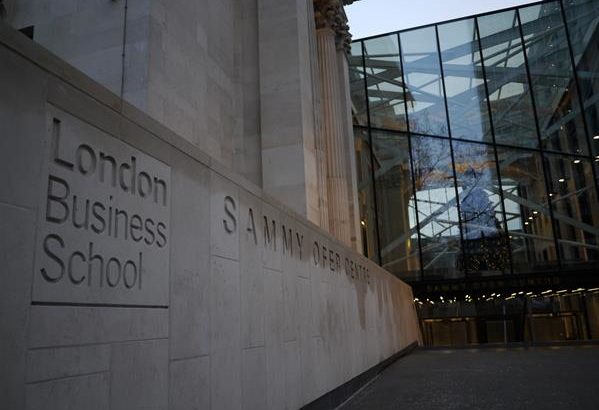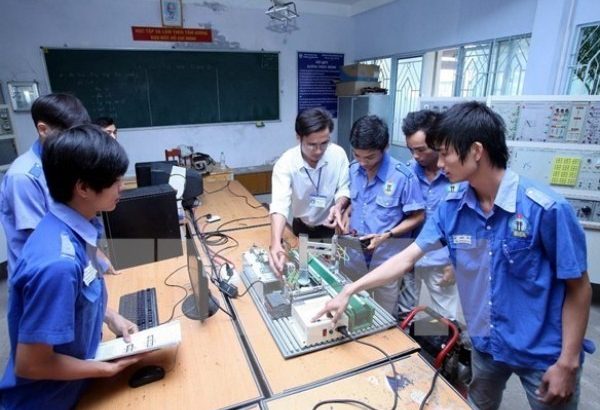Reino Unido/Enero de 2018/Autor: Paul Milligan/Fuente: INAVATE
Resumen:
Una combinación de inversión de varios millones de euros y un proceso de instalación de un año de duración ha resultado en un impresionante proyecto en la London Business School, donde la educación se encuentra con las empresas. Paul Milligan informa.
La apertura del Centro Sammy Ofer ha visto a London Business School (LBS) entrar en una nueva era. El proyecto de 125 millones de euros incluyó la remodelación de la Casa del Consejo del Ayuntamiento de Old Marylebone y de los edificios del Anexo, utilizando el espacio excavado entre los dos edificios para crear una nueva estructura de acero y vidrio. El edificio lleva el nombre del magnate naviero israelí, e incluyó una donación de 25 millones de euros de su hijo Idan, que se graduó con un MBA de la escuela en la década de 1980. Diseñado por los arquitectos, Sheppard Robson, cuenta con 35 salas de seminarios, 10 salas de estudio, ocho nuevas salas de conferencias, incluyendo dos aulas de planta baja, dos salas de juntas ejecutivas, un puñado de otros espacios AV pequeños, una nueva biblioteca, múltiples áreas de reunión y dos cafeterías . En total, el nuevo Centro ha aumentado el espacio de enseñanza en LBS en un 70%.
A combination of multi-million euro investment and a year-long installation process and has resulted in a stunning project at the London Business School where education meets corporate. Paul Milligan reports.
The opening of the Sammy Ofer Centre has seen the London Business School (LBS) enter a new era. The €125 million project included the refurbishment of The Old Marylebone Town Hall’s Council House and Annexe buildings, using the excavated space between the two buildings to create a new glass and steel structure. The building is named after the Israeli shipping magnate, and included a €25m donation from his son Idan, who graduated with an MBA from the school in the 1980s. Designed by architects, Sheppard Robson, it features 35 seminar rooms, 10 study rooms, eight new lecture theatres including two flat-floor classrooms, two executive boardrooms, a handful of other small AV spaces, a new library, multiple breakout areas and two cafeterias. All told, the new Centre has increased teaching space at LBS by 70%.
Founded in 1965, LBS is a post-graduate education establishment offering MBA, Masters and executive education programmes. It has been recently been named as the top graduate business school in Europe for the fourth year running by the Financial Times.

The grade-II listed building, owned by Westminster Council had lain empty for years because the council couldn’t fund a renovation. Already looking to expand to another site in London close to its HQ in Regent’s Park, LBS took on the building and is renting the property on a long-term lease with agreement that it houses Westminster Council meetings six to eight times a year. The famous wedding venue (Paul McCartney and Ringo Starr were both married there) has also been renovated as part of the project.
Planning for the (multi-million euro) AV side of things began early in 2013 when LBS engaged AV consultants Blend to formulate a plan with Wayne Buttigieg and his team. Buttigieg is head of Infrastructure and Media Services at LBS and had a clear idea from day one what the AV should achieve. “We wanted to have world-class teaching facilities. We wanted the best. That doesn’t always go hand in hand in a grade-II listed building. We wanted an AV consultant in early on to engage with the architect because we knew the spaces were going to involve constraints. There are some rooms where you can’t do anything to the floor. That was the first stage. Then we worked through the design, came up with a budget and took us to tender.”

Four system integrators took part in the tender, with GV Multimedia chosen as the winner, GV then took over design responsibility from Blend in August 2016 as the build started to take shape. As he knew this project was on the horizon, Buttigieg has spent years visiting ISE to get an idea of the products he would use and, as a result, everything you see on site now has been hand-picked. “It wasn’t Blend coming to us with a complete design, it was an evolution of our existing campus, to take it to the next level,” he says.
The project, for both client and integrator was a lengthy, sometimes difficult and detailed job. The tender process took place in December 2015 and GV first started installing cable runs in May 2016 to ensure late-to-be-sealed routes were in placed in line with the build programming. Following the 155-week build programme, handover from the main contractor took place at the end of July 2017, with students on site at the end of August 2017. To help manage the process and keep engaged with the building and architectural work, GV employed a contracts manager to attend the (frequently daily) planning meetings.

The main focus for GV was to supply top class AV for over 50 teaching and meeting spaces, digital signage, boardrooms and eight new lecture theatres with a central control room, all spread across four floors and two buildings. Wherever possible GV has tried to standardise the AV, as a result it often resembles a high-end corporate office rather than a traditional educational establishment. The two flat-floor lecture theatres on the first floor are a great example of that. Both rooms seat 35 students in a flipped-classroom style, where the only thing fixed to the floor is the custom made Simon Kohn all-white desk. Each lecture theatre has its own custom-sized version of the desk and control system, all designed to be used quickly and easily by teaching staff. Each desk refines an existing design piloted successfully on other sites. The only AV the staff can see on the desk itself is a 24-in Dell touchscreen monitor and 20-in widescreen AMX touchscreen, a standard PC is hidden underneath the desk.
“PCs used to be in the rack, but it’s all about getting the teaching going quickly, if the user sees a blue screen they can turn it off. Before they would have to phone someone up,” adds Buttigieg.

It is only when you look closely at the desk will you see one of the many clever features in the room. A full-width frosted glass panel sits on the desk surface, above it fixed in the ceiling is a Wolfvision VZ-C12 visualiser. This means the teaching staff can write on the (wipe-clean) surface and the text appears directly on two 94-in screens behind them, using Christie short-throw laser 4,000 lumens projectors. When the lecturer is finished or has filled up the screen with text, the image can be saved on the intranet or via USB. Simply wipe with a cloth and start again. Not only is the technology inventive, but it allows the teaching staff to remain in face-to-face contact with the students at all times, instead of students having to stare at the back of the lecturer’s head whilst they write.
Alongside the two screens behind the lecturer, these two flat-floor lecture theatres have AV split down the middle of the room; on each side is an 84-in Smart Kapp board, one 80-in NEC flat panel and one traditional whiteboard. This is so the students can break out into discussion groups and be near the technology wherever they sit. It’s also possible to send the signals from the desk to all of the technology. “We are seeing more and more flipped classrooms, where students will sit through some pre-required learning (video or text), and then come into a session where they can focus their time with the academic staff to get the information they really need and work collaboratively with their peers,” says Daniel Victory, group technical director, GV Multimedia.

Audio pickup in the room is via tiny AKG button boundary microphones dotted around the ceiling. The rooms are also set up for Skype for Business and a Panasonic PTZ camera runs into a Sonic Foundry Mediasite lecture capture system, as well as simultaneously providing for remote monitoring and Skype via IP and USB. If they want extra voice reinforcement, staff can also wear Revolabs Executive Elite wearable microphones around their necks. The main campus at LBS has used Mediasite for years, but there is a clever twist on its installation in the Sammy Ofer Centre explains Buttigieg. “To encourage usage instead of having to schedule recordings you can now record on the spot using the desk. You click on the screen (which has an NFC reader inside) with your ID pass and it recognises who you are then, depending on permissions, you can record your lecture. When you hit save it puts it in your folder on the server, ready to make available or edit if desired. It records audio, video and the last source selected (slides etc).”
To make sure all the new AV was used to its fullest, Buttigieg and his team, following training from GV Multimedia, ran a series of 30-minute induction sessions for staff. “We changed the design of the panel to make it super-simple. When it’s turned off all you see is a big start button. You hit start and it takes what is displayed on the PC and puts it on the screens straight away, and that covers 70% of what people really want to do. If you want to go beyond that, it’s in stages – stage one select your source etc.” From the beginning of the process it was obvious the UI was going to be key to adoption of the technology says Victory. “It took a lot of conversations, and what we have now was pared back quite a bit from some of the initial discussions to ensure optimal user experience. We went through the workflow numerous times throughout the project to find out what the fewest buttons you had to press to get the lecture going were.” Using laser projectors has also helped transform class start up times adds Buttigieg.

In addition all lecture theatres and seminar rooms have Barco WeConnect wireless mirroring. This was for various reasons says Victory: “If you are teaching and you have an iPad it means you aren’t stuck behind a desk, you can get up and walk around. It also means the students can connect wirelessly, to show the group work they have been working on, on the big screens. Additionally, the team at LBS have been working with Barco to allow lectures to be broken out to the seminar rooms on each floor and to allow the content being worked on to be reviewed comparatively from the main Barco node in the lecture theatre, either full screen or tiled as required.”
Outside each seminar room and lecture theatre are custom-made mounts for AMX room booking display screens to ensure a matched fit with other custom signage. Custom programming was done by GV to interface the room booking system to merge with the AMX interfaces.
In another wing are the next four lecture theatres, holding 85 people in each, in beautiful wood-panelled rooms. Again, the AV mirrors the other lecture theatres, a white desk controls the AV on two Vutec 111-in or 123-in projection screens depending on room height available. The screens are served by two NEC 8,000 lumens laser projectors, hidden on hoists carefully integrated into the wooden slatted ceiling. The projector screens are custom designed to allow them to be blended together to make one screen, for consistency with existing spaces the system permits the users to show two different pieces of content (slides, video etc) at the same time, side-by-side. Having two projectors also provides redundancy if one fails, notes Buttigieg.

Audio throughout the Sammy Ofer Centre is run on Dante. All of the audio in the rooms is collected through a DSP, which allows Buttigieg’s team to monitor mic and audio levels from the control room and also to send audio to other rooms in case of class overspill as well as being instrumental in the larger DSP requirement in the largest of their lecture theatres.
Monitoring of the lecture theatre AV technology is done via their main control room which uses in-room technology such as cameras and Mediasite, all routed via SVSi AV-over-IP technology (including a multi-preview display of all lecture theatres simultaneously on a 65-in NEC display) to provide near-instant monitoring from any of the lecture spaces. AV control in this space allows quick and full remote control of the outlying spaces via AMX RMS software and an in-room 10-in AMX touchpanel. A pair of bookable Polycom conferencing units are also available to and from each lecture theatre and the main control room, with all signals and control for the cameras and content passed over the network due to the long cable distance. “Getting all of the networked devices online and working on a fully converged network took a lot of close coordination with the client IT-team. This was essential both for system operation and to ensure the client network was unaffected” adds Victory.
Moving upstairs, you come to the biggest teaching space of all, a 200-seat lecture theatre, capable of being split into two exact 100-seat spaces. The room can be divided using a motorised Skyfold wall which is capable of concealing noise from the other side up to 50db. Innovation in this room comes in the form of two audio systems. Because this theatre is used for both lectures and as a Council Chamber, choosing the right microphones was difficult. In the end, to keep desks uncluttered, 36 Earthworks microphones drop down from the ceiling on Servoreeler retractors when needed.
Because the room has two large 7.25m projection screens (providing two 163-in displays per screen), each served by two Panasonic 12,000 lumens laser projectors along with a highly complex slatted ceiling, that meant there wasn’t a lot of room left for loudspeakers, so some creative thinking was needed. The solution came in the form of perforated projection screens made by Monarch and mounted onto GV-designed, custom, angled frames behind which two Renkus-Heinz digitally steerable line arrays are hidden.
The rooms, again, have the same desk control space, but also feature two NEC displays with Shadowsense touchscreen technology mimicking the projection for direct interaction and Telemetrics camera system for Westminster and Business School uses. The Council now has the added ability to stream and record the event via a NewTek Tricaster. Using a touchscreen Elo panel the operator can zoom in within seconds on any speaker in the room via the 200 preset positions programmed into it. Alongside the Telemetrics and Tricaster control surfaces are also an iPad (for room control) and a mixing desk up in the technical space rear corner of the room to control the AV for the council meetings. To enable rapid deployment, the desk is connected simply by power and a Dante network connection which provides full connection to the ceiling, floorbox and wireless microphone positions and routing to all destinations, including the Westminster Reception room for relay during functions.
The 35 Seminar and 10 Study rooms are used by staff and students (booked via an app) for meetings and collaborative teaching. Seating between 6-12 people around the building, the rooms feature individually custom-made tables with connectivity inside. A selection of 42-in Smart Kapp boards, NEC P Series displays and Logitech MeetUp huddle room conference systems can be found on the walls in these spaces.
So what difference has the new technology made to the LBS? “Previously in the seminar rooms we had a PC in the corner of the room with a little screen which could only be used by one person, even though there was up to eight in the room. Now we have 35 rooms where our students can collaborate,” says Buttigieg. “In the lecture theatres it has given us the ability to put into practice a lot of the ideas we’ve had over the last few years. By starting a lecture theatre from scratch it means you can put visualisers in from the off, rather than retro-fitting them. It has given us the chance to try out different technologies, like the mirroring. There is an expectation from the faculty now there will be new technology, so it has given us the opportunity to put it in.”
KIT LIST
Audio
AKG C562 ceiling microphone
Ampetronic CLD1AC-CD desk induction loop
Audac WX302/B loudspeakers
BSS BLU-102 conferencing processor
Clockaudio S 135-RF desktop mic
Ecler eGPA2-150 amplifier
Extron XPA 1002 amplifier
K-array KY102 array loudspeaker
Kef Ci160QS ceiling loudspeakers
Polycom Soundstructure C12, Soundstructure C16 audio DSP
Renkus Heinz IC16-8-RD array loudspeaker
Revolabs Executive Elite wireless microphone system
Shure SM58 mic
Soundcraft Performer II digital console
Vaddio EasyUSB audio bridge
Control/distribution
AMX MSD-1001 and MSD-431-L display screens, Modero X Series touch panels
Atlona AT-HDVS-150-TX AV signal extender
Extron USB Extender Plus T transmitter
Mounting
B-Tech BTEBT7535B articulating arm wall
Chief XSM1U wall bracket
Display Devices DL3 1B-14 ceiling visualiser hoist
Ergotron 45-245-026 LX DUAL articulating arm bracket
SMS Func Bracky XL wall bracket
Top-Tec TT485-Y03 wall display bracket
Unicol PZX1 wall bracket
Fuente: http://www.inavateonthenet.net/case-studies/article/education-meets-corporate-at-the-london-business-school






















 Users Today : 19
Users Today : 19 Total Users : 35460733
Total Users : 35460733 Views Today : 36
Views Today : 36 Total views : 3419906
Total views : 3419906